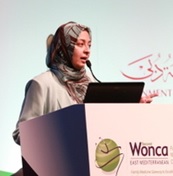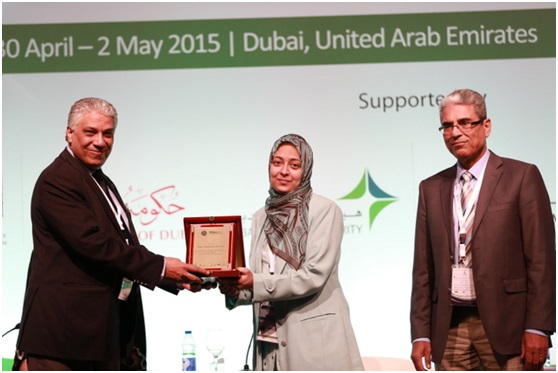Montegut scholar report for WONCA/EMR 2015 conference
 Nagwa Nashat Hegazy (pictured presenting) was a Montegut Scholar attending the recent WONCA East Mediterranean region congress was held from 30 April to 2 May 2015 in Dubai city in the UAE. Nagwa is a lecturer in family medicine at the Faculty of Medicine,
Menoufyia University, in Egypt. She is a young general practitioner who
is not only a lecturer but also a member of the exam committee of the
Egyptian fellowship of family medicine and health. She is chair of the Al Razi movement for young doctors in the WONCA East Mediterranean region.
Nagwa Nashat Hegazy (pictured presenting) was a Montegut Scholar attending the recent WONCA East Mediterranean region congress was held from 30 April to 2 May 2015 in Dubai city in the UAE. Nagwa is a lecturer in family medicine at the Faculty of Medicine,
Menoufyia University, in Egypt. She is a young general practitioner who
is not only a lecturer but also a member of the exam committee of the
Egyptian fellowship of family medicine and health. She is chair of the Al Razi movement for young doctors in the WONCA East Mediterranean region.
This edited report written by Nagwa is reproduced with the permission of the American Board of Family Medicine Foundation (ABFM-F) who provide the scholarship. The scholarship was established to foster international education, research and
collaboration, in the specialty of family medicine. It supports the
attendance of one family physician from each of the seven regions of WONCA to their
regional meetings or to the international meeting in the year when it is
held.
more about the Montegut Scholarship
The WONCA East Mediterranean region congress ran 16 sessions in parallel with five workshops for three days under the theme of "
Family medicine gateway to excellence in health care systems".
It provided me with an outstanding educational opportunity. First of all, I was able to meet family practice specialists from all around the EMR region which gave a great chance for communication, sharing difficulties and differences. Moreover it refreshed and updated my scientific background regarding many topics. Also it showed me a diversity of research with different outcomes that me enthusiastic to do similar ones to compare the regional differences. Furthermore it draws my attention to area that unnoticeable before.
Day 1
It started with the opening ceremony and welcome Address then I had to attend the first workshop which was pre-registered. It was titled "Initiating Type II Diabetes Patients on Insulin" and Directed by Prof. Thomas Forst. It was a very interesting session from all the aspects as nearly one fourth of the family health care attenders are diabetics. I had refreshed my knowledge regarding the treatment requirements for pharmacological intervention in type II DM. I also knew about the once‐weekly glucagon‐like peptide‐1 receptor agonist (Dulaglutide) in a ready‐to‐use pen. Moreover I learned not rush in using insulin in type II diabetes as in comparing the cost effectiveness regarding the insulin resistance should slow me up.
Then I joined session 2 which was the best investment In Achieving Stable, High Quality Health Care and session 3 which was a panel discussion. It was the first time for me to attend a panel discussion and I found it very informative and fruitful. It was under the titile of "Learn from Expert" where the panelists were Dr. Amer Sharif, Dr. Nawal Alkaabi and Prof. Taghreed Farhat and the p anel Moderator was Dr. Afaf Jaffer. It was about training & research/ medical education and evidence based Medicine in family practice.
Then I attended session 4 which was around Quality & Accreditation in family practice, Followed by session 5 for the oral presentations. It was interesting to hear Sreyosh Alam oral presentation as she is a medical Student in Alfaisal University in Saudi Arabia. Her presentation was the Impact of multithematic longitudinal curriculum in family medicine on career choices in undergraduate medical students. It was impressive to have medical students among the presenters' beside the topic itself. She discussed how family medicine study in the undergraduate may influence the career choice. This had touched me as a lecturer because I have undergraduates.
Day 2
I joined session 6 that included a diversity of topics about diabetes mellitus treatment, diagnostic and screening approaches to the breast and choosing the Optimal Combination is a Science not an Art. It was information refreshing and updating. It also gave an idea about some protocols in different countries. For example it was agreeable to know that in Australia there is a governmental screening program applied to women from 50 years old .Screening is done by mammography through two views for both breasts and interpreted by two radiologists. Furthermore choosing the optimal combination is a science not an art was an educational one where the treatment of a hypertensive patient was discussed according to NICE, JNC8 and AHA protocols.
Then I shared in the third workshop which was Life Transitions and Resilience in the Workforce Workshop that was directed by Dr. Amanda Howe. It was a quiet motivating workshop. I was able to identify the idea of professional resilience. It was around everywhere but recognizing its terminology and core items were a new step. We also exposed few challenges to resilience faced by female physicians in the EMR. There were different challenges and most of them were cultural and ant gender among the workshop attenders. It was noticeable that the strategies that have been shown to support women through these events were on individual base.
I returned to the main hall to attend Session 8: Challenges in Family Medicine, Session 9: Well Being and Session 10: Oral presentations.
 Day 3
Day 3
I joined session 11 for the oral presentations where I was impressed by the oral presentation titled "Metabolic syndrome in osteoporotic postmenopausal women attending a family practice clinic in Jordan". The topic and methodology were educational. After That I attended session 12 for mental health where I had a talk about counseling skills. I then received an thankfulness certificate for the talk.
Photo shows Nagwa receiving a celebratory plaque from Dr Mohammed Farghaly (HOC chair) while Dr Hany Swidan observes.
Session 13 had many interesting topics; the health aging presentation by Dr. Ahmed Mohamed Foul was quite enlightening. I learned about new pharmaceutical agent, telomerase enzyme supplement that acts as anti-aging.
Then there was session 14 for oral presentations, session 15 for palliative care and session 16 for oral presentations.
I was interested in two presentations the first was the Impact of Female Genital Mutilation Worldwide presented by Dr. Sinan Jabbar, General Practitioner/Family Physician in the NHS Primary Care in United Kingdom. I was surprised by the figures shown for FGM and by the cultural believe behind it.
The second was Antepartum Depression; Prevalence in Muscat Region, Outcome of Pregnancy and the Risk of Developing Postpartum Depression presented by Dr. Maisa Al-Kiyumi. It showed that the mode of delivery has a relation to Antepartum depression which was reported in 24% of the participants in the study in the study.
It was shocking to find that women have huge problems with the mentioned figures in both presentations which highlighted in my mind the workshop I attended about Women Resilience.
Acknowledgement
I am deeply indebted to the American Board of Family Medicine Foundation (ABFM-F) for their Montegut Global Scholars Program that foster international education, research and collaboration, in the specialty of family medicine.
I also would like to express my deep gratitude to Dr. Mohammed Ibrahim Tarawneh WONCA/ EMR President for his kind guidance, initiating power, stimulating suggestions and continuous encouragement.
Finally I would like to extend my appreciation to all those who helped me in gaining the scholarship, facilitated its process and directed me in each step.